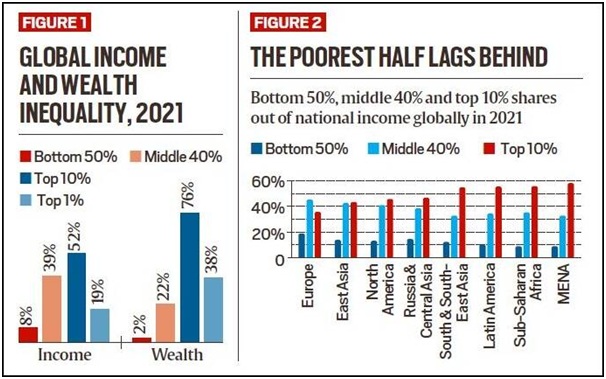World’s most extreme inequality increase in India: World Inequality Report
Context
India stood out in terms of income and wealth inequality, claimed the World Inequality Report 2022.
|
Income inequality before British vs after British
|
Background
- Since the mid-1980s, deregulation and liberalisation policies have led to one of the most extreme increases in income and wealth inequality observed in the world.
- India stands out as a poor and very unequal country, with affluent elite.
- The report is published by The World Inequality Lab, a global research initiative.
- The report is authored by Lucas Chancel, co-director of the World Inequality Lab and coordinated by famed French economist Thomas Piketty among others.
- The World Inequality Report 2022 presents the most up-to-date and complete data on the various facets of inequality worldwide:
- global wealth
- income
- gender
- ecological inequality
- The data and analysis are based on several years’ work by more than 100 researchers from around the world.
Analysis
What does the report say?
- Decline in share of public wealth: The share of public wealth across countries has been on a decline for decades now.
- Public assets typically include public buildings housing administrations, schools, universities, hospitals and other public services.
- Covid impact on public wealth: The 'secular decline' in public wealth and rise in private wealth was exacerbated by the outbreak of the coronavirus pandemic.
- Increase in private wealth (emerging economies): Emerging economies like India and China experienced faster increases in private wealth than wealthy countries after they transitioned away from regulated economies.
- Poor Government: Countries across the world have become richer over the past 40 years, but their governments have become significantly poorer.
|
Facts from the Report
|

How ‘unequal’ is India?
- Fast inequality: India’s wealth distribution also signals how fast inequality is growing.
- A household, on average, had wealth worth Rs 983,010. But the general wealth held by the bottom half was “almost nothing” at Rs 66,280. That’s just 6 per cent of the Indian average.
- Across the world, India is deprived of wealth or capital to inherit.
- Gender inequality: Gender inequalities are also very high in the country. The female labor income share is equal to 18 per cent. This is significantly lower than the average in Asia, excluding China, at 21 per cent.
- Speculation over data: Over the past three years, the quality of inequality data released by the government has seriously deteriorated which has made it particularly difficult to assess recent inequality changes.
- Increase in private wealth: In India, particularly, private wealth went up from 290% in 1980 to 560% in 2020.
|
The actual story
|
What are the consequences of rising inequality?
- Destabilization: Rising inequality is strongly associated with increasing support for populist politicians and economic protectionism. The discrediting of mainstream parties and rising anger erodes the ability of societies to address critical challenges.
- For example, in the United States, the lack of public consensus has undermined the effectiveness of lockdowns, masks and vaccinations during the pandemic and has led to the politicization of policies about the phasing out of fossil fuels to address the climate emergency.
- Making poor vulnerable: Poorer people suffer most from crises, as they have fewer savings and are more exposed to risks from weather, poor health and economic fluctuations.
- Exacerbation of economic challenges: Growing inequality exacerbates other social and economic challenges, including stagnating productivity, increased crime, ill health and depression.
- Threatened international cooperation: Inequality undermines the commitment of governments to work with others to find common solutions to address systemic risks facing societies such as climate change, the Covid pandemic, cyber-crime and financial turmoil. Thus, such inequality threatens international cooperation.
- Unstable world: The above result is a more unstable world, which undermines growth and increases inequality, which in turn causes more instability.
Suggestive measures to reduce inequality
- Raising income and increasing economic growth.
- Equal access to education, health, energy, internet and other services
- Guaranteeing minimum standards for everyone accessing public services
- Private investment is vital, but so too is government expenditure
Concluding thoughts
Inequality is not an abstract concept. It needs to be tackled with effective cooperation to release the potential of societies and ensure that more cohesive and sustainable world is built.





